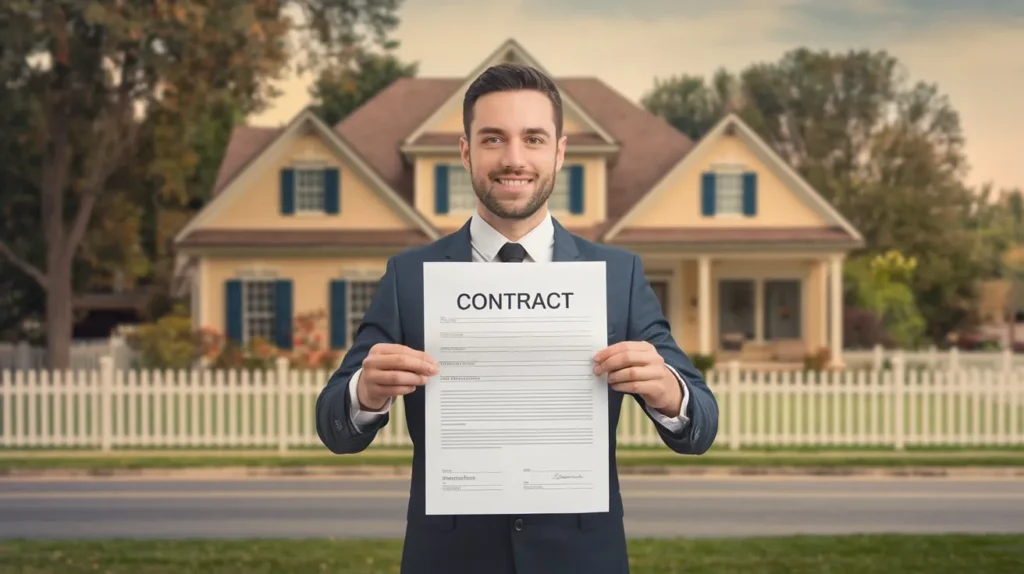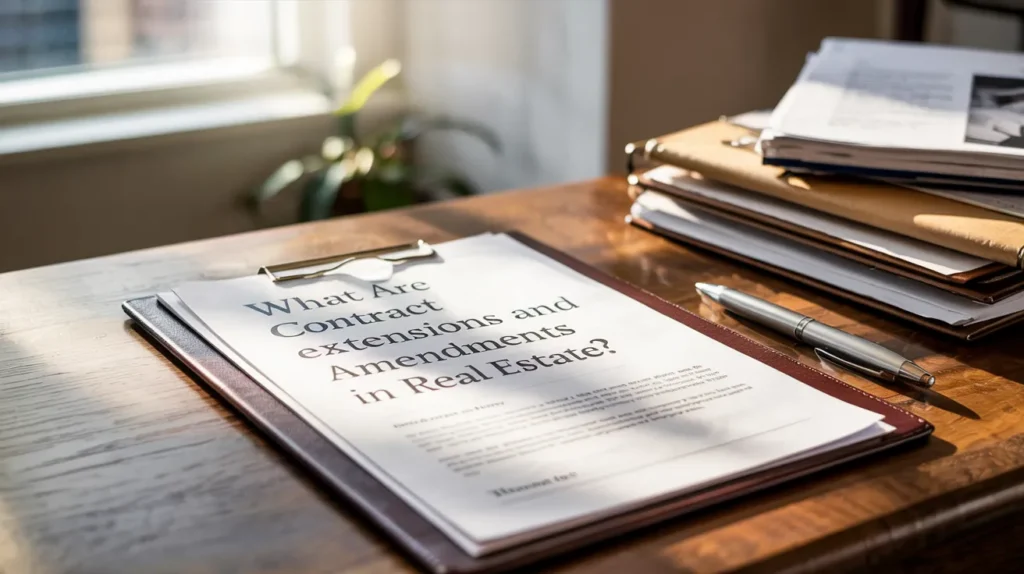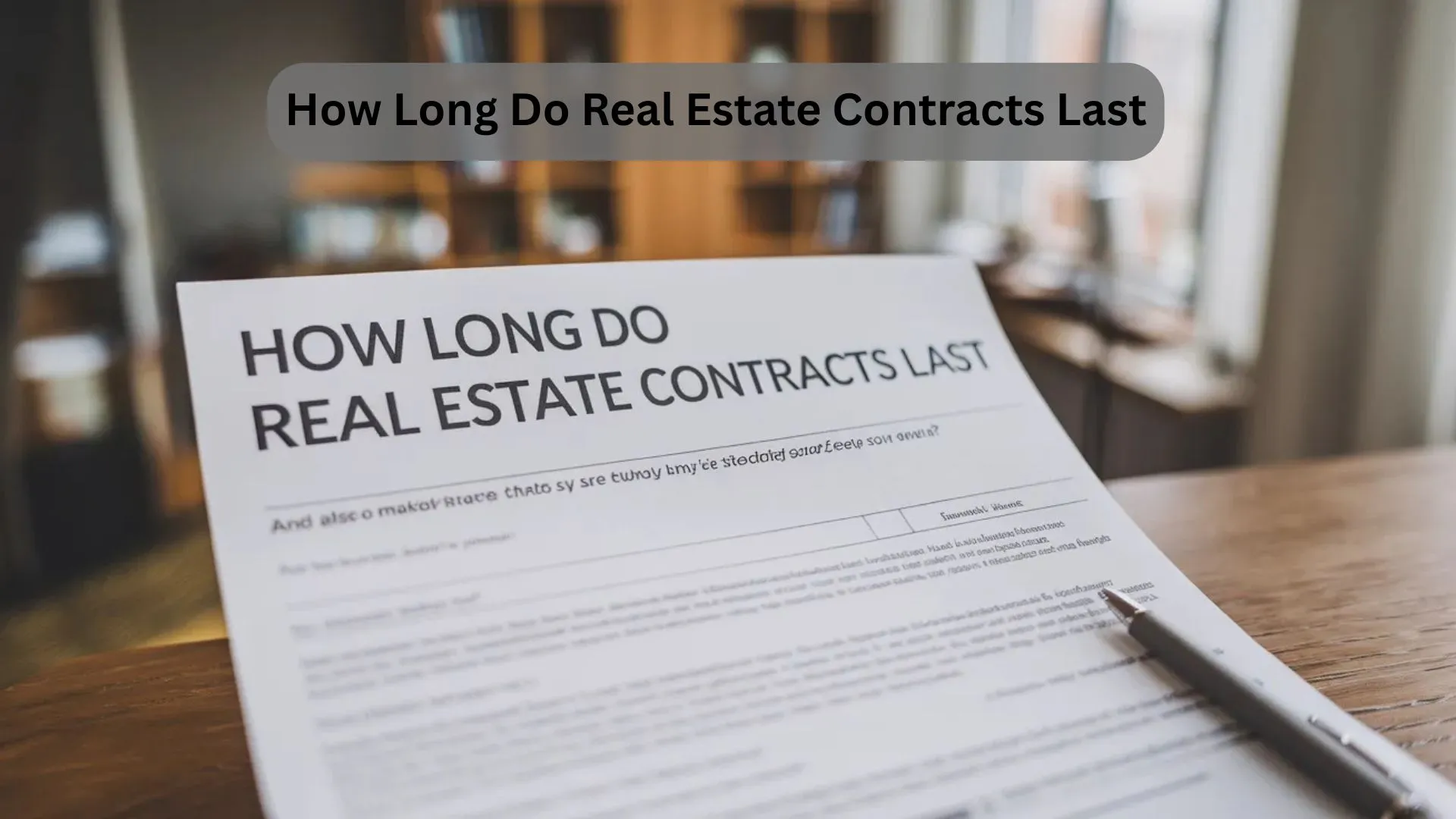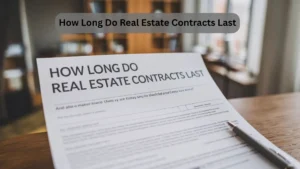How Long Do Real Estate Contracts Last – Get the Facts Now!
Real estate contracts usually last 30 to 60 days. The time can change based on factors such as loans or inspections. Both buyer and seller can agree to a different length.
Stay connected with us as we discuss the duration of real estate contracts. We will explain everything you need to know about contract timelines. Keep following for more.
What Is A Real Estate Contract?
A real estate contract is a legal document. It is used when someone buys or sells a house, land or building. It includes details such as price, closing date, and who will cover the costs. Both buyer and seller must sign it. It helps protect both sides from problems.
What Are The Common Types Of Real Estate Contracts?
There are several types of real estate contracts. Each one serves a different purpose. Understanding them helps in making informed decisions.
- Purchase Agreement: This is the most common contract. It outlines the terms and conditions of the sale between a buyer and a seller.
- Lease Agreement: This contract is between a landlord and a tenant. It specifies the rental terms, including duration and payment details.
- Real Estate Assignment Contract: Used when a buyer transfers their purchase rights to another party before the sale is finalized.
- Power of Attorney: Allows someone to act on behalf of another in real estate transactions, often used when the principal cannot be present.
- Land Contract: The seller finances the property, and the buyer makes payments directly to the seller until the full price is paid.
Why Does Contract Duration Matter In Real Estate?

Contract duration matters in real estate because it indicates the amount of time both parties have to complete the deal. It helps the buyer and seller stay on track. If someone does not follow the time rules, the deal can get delayed or canceled. It keeps things clear and safe for everyone.
What Is The Typical Duration Of A Real Estate Contract?
The typical duration of a real estate contract is usually between 30 to 60 days. This allows time for tasks such as home checks and loan approvals. Some contracts can be longer, like 3 to 6 months, if the home takes time to sell. The time can change if both sides agree.
Take Analysis To: 1031 Exchange Stocks To Real Estate – You Need to Know!
What Is The Difference Between House And Business Contracts?
| Aspect | House Contract | Business Contract |
| Purpose | To buy, sell, or rent a home | To buy, sell, or rent a business property |
| Parties Involved | Buyer and seller or landlord and tenant | Business owners, investors, or partners |
| Complexity | Simple and easy to understand | More complicated with many details |
| Duration | Short, usually 30 to 60 days | Can be longer, from months to years |
| Terms & Conditions | Basic and fewer rules | Many details about business rules and profits |
What Happens When A Real Estate Contract Expires?
When a real estate contract expires, it comes to an end and is no longer valid. Neither the buyer nor the seller has to follow the terms anymore. They can choose to renew or extend the contract. If they do nothing, the property might be sold to someone else.
How Long After A Real Estate Contract Expires?
After a real estate contract expires, the property is no longer for sale under the terms of that contract. However, some contracts have a protection period, typically around 90 days, during which the original agent can still receive payment if the buyer from the contract purchases the property. Once that period ends, the seller can relist the property or sell it without any restrictions.
What Should You Do After A Real Estate Contract Expires?

After a real estate contract expires, you should first check if there is a protection period in place. Then, talk to your agent and decide whether you want to renew the contract or find a new one. You can also take a break or relist the property at a later time. Always read the old contract carefully before making a new decision.
What Is A Listing Agreement In Real Estate?
A listing agreement in real estate is a contract between a seller and a real estate agent. It gives the agent permission to sell the property. It includes the price, period, and agent fees. The seller signs it to start the selling process. It helps both parties understand their roles and responsibilities.
What Is A Purchase Agreement In Real Estate?
A purchase agreement in real estate is a contract between a buyer and a seller. It shows that the buyer wants to buy and the seller wants to sell. It includes details such as price, closing date, and property terms. Both sides signed it to finalise the deal. It helps protect both buyer and seller.
Have You Explored? Can You Sell Real Estate Part Time – You Need To Know!
What Are The Common Factors That Affect Contract Timelines?
Many factors can affect the duration of a real estate contract. Some of these are common and easy to handle. Others can cause delays. It is good for both buyer and seller to know these things to keep the deal smooth.
1. Loan Approval:
If the buyer requires a loan, the bank must verify documents such as income and credit. This can take many days. If the loan is late, the entire deal slows down.
2. Home Inspection:
The buyer may request a home inspection. If problems like leaks or damage are found, the buyer may ask the seller to fix them. This can take more time.
3. Appraisal Process:
The bank determines the value of the home. If the value is too low, the buyer may not get the full loan. Then both sides may need to change the deal. This adds a delay.
4. Title Search Issues:
A title company verifies who owns the home and checks for any potential legal issues. If there are old loans or unpaid taxes, they must be fixed first. That takes more time.
5. Buyer or Seller Delays:
Sometimes, the buyer or seller is slow to respond or sign the papers. This makes the process longer and causes a delay in the closing process.
6. Local Rules or Laws:
Some places have additional steps, such as special checks or forms. These rules can also slow down the contract and closing time.
What Are Contract Extensions And Amendments In Real Estate?

Contract extensions in real estate give more time to finish the deal when the original deadline is missed. Amendments are changes made to the contract, such as price, date, or terms, after both parties agree. These help solve small issues without ending the deal. Both must be in writing and signed by the buyer and seller.
How can a real estate contract be extended?
A real estate contract can be extended by writing a contract extension form. Both the buyer and seller must agree and sign it. The new form will include the updated dates and any relevant changes. This helps give more time to finish the deal.
Can A Real Estate Contract Be Terminated Early?
Yes, a real estate contract can end early. It can happen if both sides agree to stop. It can also end if one side does not follow the rules. It can also end if the loan is not approved or the home has big problems.
Interesting Fact: 100% Commercial Real Estate Financing – Complete Guide 2025!
What Are Some Tips For Managing Real Estate Contract Timelines?

Managing real estate contract timelines is important to keep things running smoothly. Staying organized and planning helps avoid problems and delays.
1. Stay in Communication:
Keep in touch frequently with your agent, the seller, and any other parties involved. This helps solve problems quickly and keeps everyone updated. Good communication can prevent surprises and keep everything on track.
2. Plan for Inspections and Appraisals Early:
Book home inspections and appraisals early in the process to make sure a smooth transaction. These checks can take time and may reveal issues that require attention. Planning gives you enough time to handle problems before the deal closes.
3. Keep Track of Deadlines:
Write down important dates like the closing date and inspection deadlines. Setting reminders helps you remember these dates and makes sure you do not miss anything important.
4. Be Ready for Delays:
Sometimes things take longer than expected, like getting loan approval or fixing problems in the house. Be flexible and have a backup plan in case things get delayed. Patience can help things move forward even when there are delays.
5. Get Documents Ready Early:
Make sure all your paperwork is ready before it is needed, like loan approval and IDs. Having everything ready saves time and prevents last-minute rushes. It helps keep the process fast and easy.
FAQ’s:
1. How long are most real estate contracts for?
Most real estate contracts are for 30 to 60 days. This gives enough time for financing, inspections, and appraisals.
2. How long does a property stay under contract?
A property typically stays under contract for 30 to 60 days. This is the time it takes to finalize all steps before closing.
3. How long is a buyer’s agent contract good for?
A buyer’s agent contract usually lasts 6 months. The duration can be shorter or longer, depending on what the buyer and agent agree upon.
4. When can a real estate contract be terminated?
A real estate contract can be terminated if either party fails to meet the terms or if certain conditions are not met, such as failing inspections. It can also end if both sides agree.
5. How do I legally get out of a real estate contract?
To legally get out of a real estate contract, you must follow the terms in the agreement, like meeting specific conditions or paying penalties. If both parties agree, you can cancel it.
6. Can I fire my realtor while under contract?
You can fire your realtor while under contract, but you may face penalties or owe fees. It depends on the terms of the contract.
7. Can you sell privately after a contract expires in Dallas?
Yes, you can sell privately after a real estate contract expires in Dallas. The contract is no longer valid, so you are free to sell it on your own.
8. Can an owner sell privately after the license expires?
An owner can sell privately after the license expires, but if the property was listed with an agent, a protection clause may still apply for a set period. The terms of the listing agreement will affect this.
YouTube Video Guide:
Conclusion:
Real estate contracts have clear timelines and rules that help both buyers and sellers stay on track. Knowing when contracts expire, how to handle changes, and what actions to take can make the process smoother. Stay informed and communicate well to make your real estate experience easier and more successful.
You Also Have To Check:











Post Comment